高二英语Unit4 Task Period1 Helping poor children课件 牛津英语
文档属性
| 名称 | 高二英语Unit4 Task Period1 Helping poor children课件 牛津英语 | 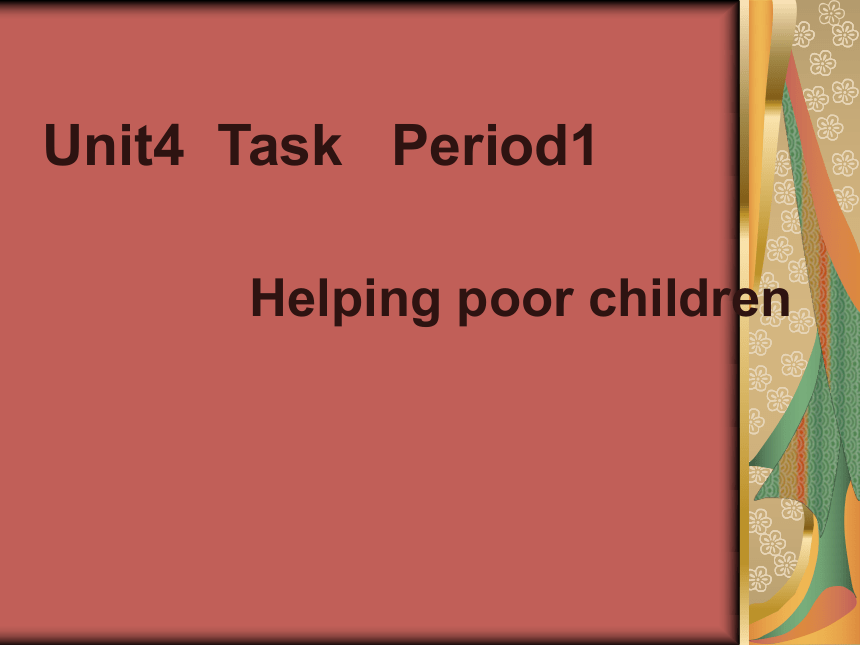 | |
| 格式 | zip | ||
| 文件大小 | 5.8MB | ||
| 资源类型 | 教案 | ||
| 版本资源 | 牛津译林版 | ||
| 科目 | 英语 | ||
| 更新时间 | 2013-12-22 15:47:07 | ||
图片预览


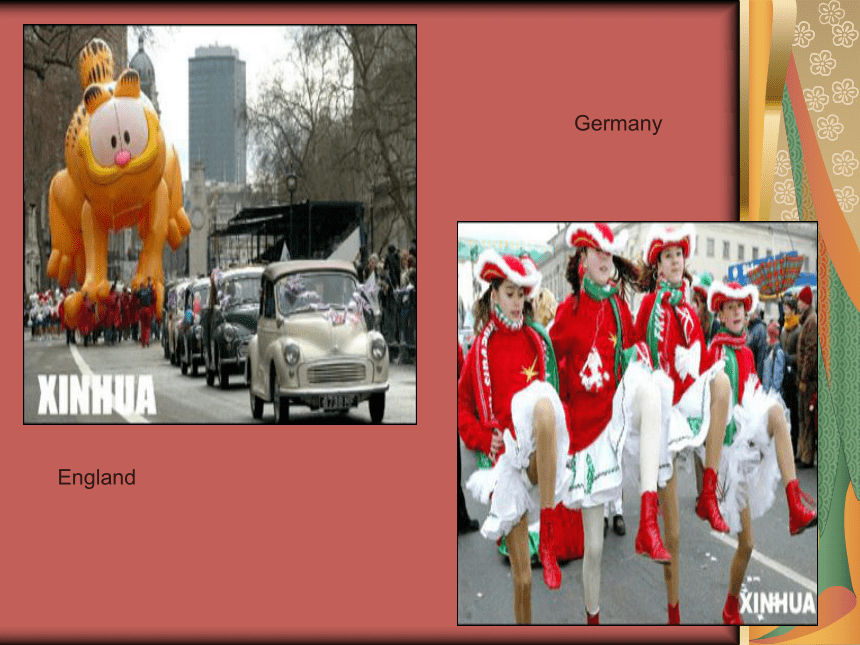
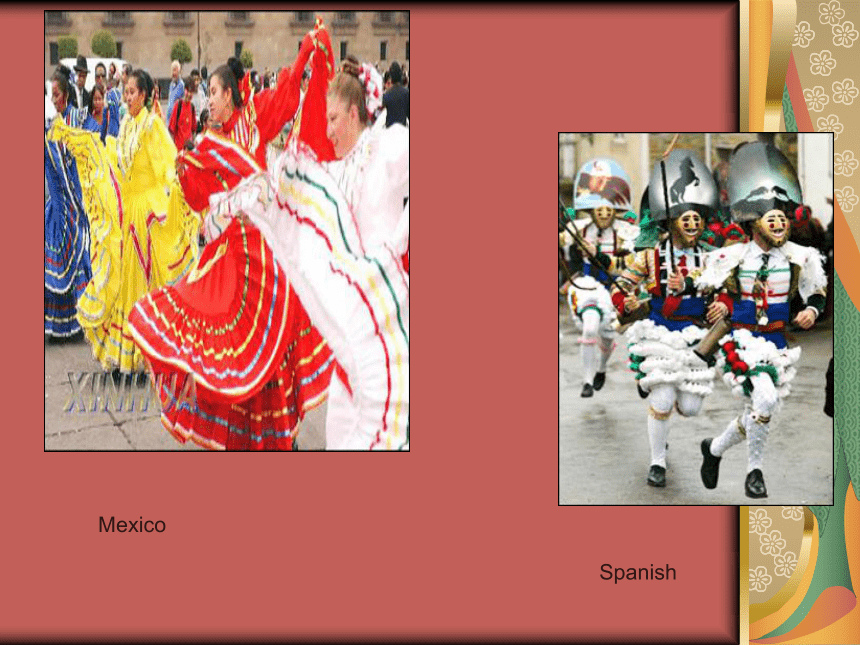
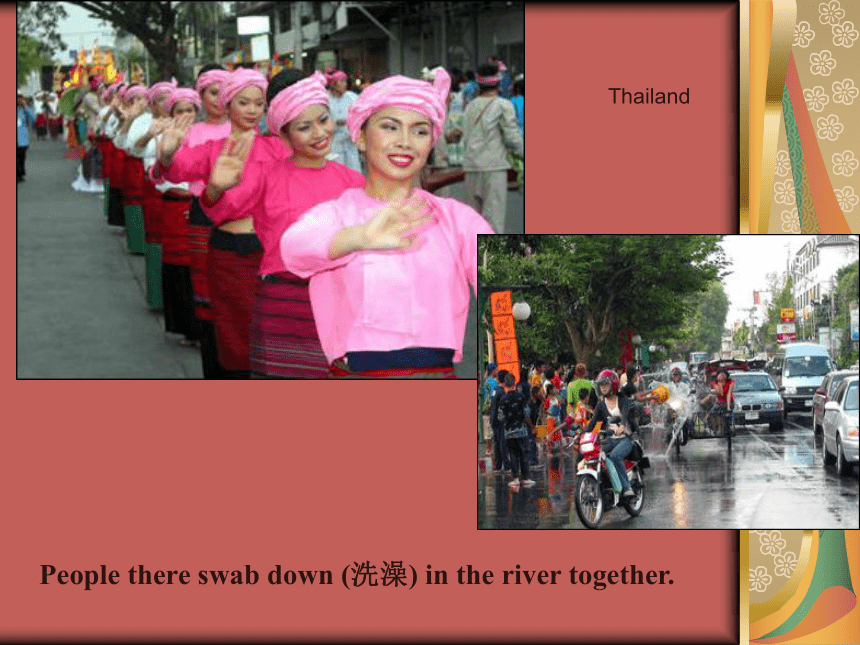

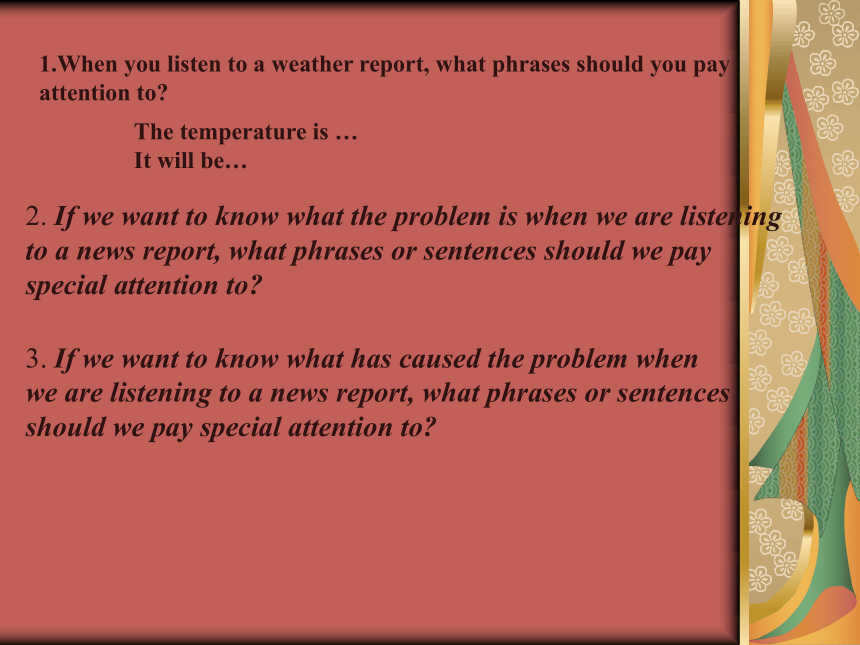
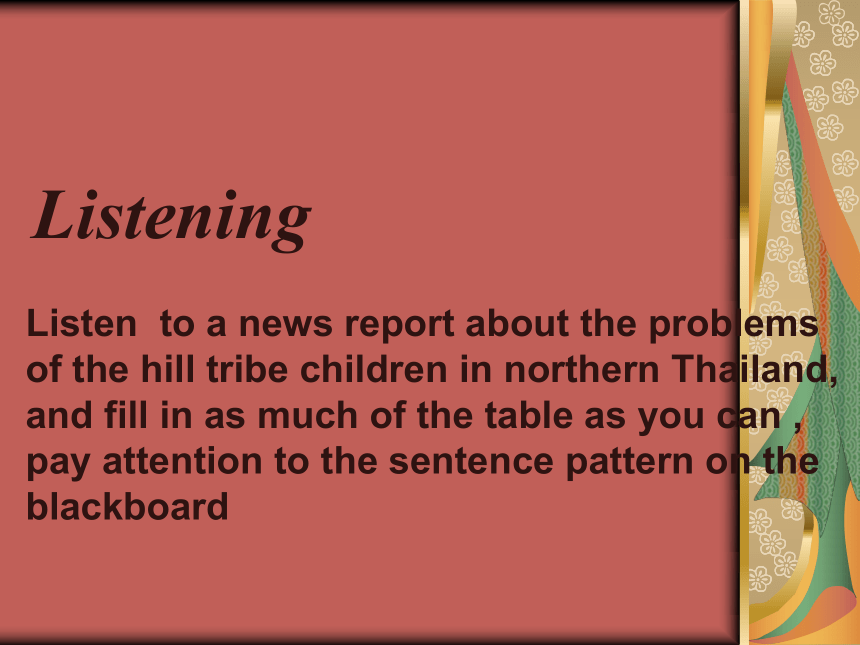
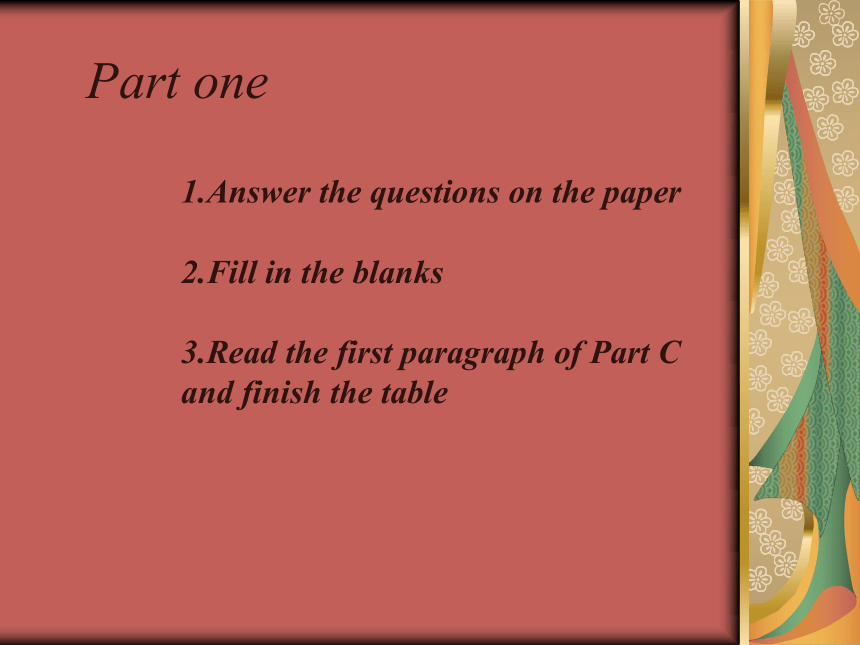
文档简介
课件28张PPT。Unit4 Task Period1Helping poor children<>EnglandGermanyMexicoSpanishThailandPeople there swab down (洗澡) in the river together.
As you can see, people are very poor. Because of poverty(贫穷),they have no money. They have few possession(财产),they wear shabby (衣衫褴褛的)clothes. They do farming by hands. Children at early age should work for the family. So celebrate New Year’s Day is a dream.1.When you listen to a weather report, what phrases should you pay attention to?The temperature is …
It will be…2. If we want to know what the problem is when we are listening to a news report, what phrases or sentences should we pay special attention to?3. If we want to know what has caused the problem when we are listening to a news report, what phrases or sentences should we pay special attention to?Listen to a news report about the problems
of the hill tribe children in northern Thailand,
and fill in as much of the table as you can ,
pay attention to the sentence pattern on the
blackboardListeningPart one1.Answer the questions on the paper
2.Fill in the blanks
3.Read the first paragraph of Part C and finish the table no running water
No moneyfew clothes or
furnitureno electricityForest has been
cut downrepairing of pumps
takes several days1.Listen to part two and fill in Table B
2.Read the second paragraph of Part C
and finish the tablePart twoThe village is poor./povertymany children especially
girls don’t go to school.
All farming done by handSmall amount of land and
water availablechildren have poor dietschildren do not grow properly
many of the children’s
parents have died of AIDS
grandparents have to bring
up children
grandgrants are old
and poor
not enough moneyDo the cloze in you paper. If you know the answer , just stand up and tell us the answer.PracticeDiscussion Talk about the problems around us and you
should talk about the following three parts, and use the key phrases on the blackboard.
What is the problem?
2) What effects will it bring?
3) How to solve the problem?Send short messagesPlay basketballBecause of poverty, she cannot go to schoolTraffic accidentHomework1.review the phrases and sentences we learn in this period
2.preview skills building 2
Happy New Year!Listen to the tape again and fill in the blanksHere I am in northern Thailand. As you can see, the families living
here are living in very poor conditions. There is no running water and
no electricity in this village. Water has to be collected from the river
10 minute’s walk away. This may seem near but when you need water
for many things, walking 10 minutes is a long time. The water then
needs to be boiled before it can be used. The result of not boiling the
water is illness. As you can see, the villages’ houses are built of wood
are not very strong. This is because they have no money and cannot
get hold of any materials. The people have very things like clothes or
furniture because they have no money and they a long way from
the nearest town. There is a bus but you have to walk kilometers
to get to the nearest road. One of the major problem facing the hill tribe children along
the mountainous borders of northern Thailand is poverty. There
is little money coming to their families and often they cannot
afford the expense to purchase important things like Medicine.
Living conditions can be somewhat primitive and another
problem is lack of firewood for cooking. The trees in many areas
are gone so there is little wood for burning. People have to walk
further and further away to find wood. We recommend using
alternative sources of fuel such as charcoal. Water is also a
problem. Some villages do not have a well and pump so the
villagers have to walk to the river with containers to fetch water.
Wells need to be dug and pumps need to be put in to pump
water into some of the villages. Unfortunately, if the pump
breaks down, the repairing of the pump takes several days, as
an engineer has to come from the nearest town to repair it.
We recommend training one person in each village to repair
the pumps.
Education is another problem area affected by hardship.
Many school are very small with only basic equipment.
Some do not even have a roof. Children sit on the floor
and there is often only one teacher to teach all the
children even though They are different ages. There is
not enough money for more than one teacher in a village;
farming is the occupation. A large problem is that children
do not go to school because their parents need help and
are forced to let the children help farm the land, collect
wood and water, and look after sick family members.
Many children do not get enough protein to eat as there
are few animals and so the children suffer from
malnutrition. Health care is limited as there are no
doctors or nurses in the villages and again no one has
the means to pay for them.As I said earlier, there is no electricity in this village, so
when it is dark, the only light comes from the small fires
that the family cooks over. Unfortunately, much of the
forest around the village has been cut down for firewood
and so the villagers have to walk further away from the
villages to get wood. This also means that water may not
be boiled for long enough as there is very little wood.
This is going to be a big problem in the future.
Over there you can see the schools. As the village is poor, the school has no roof.
There are no chairs either, so the children have to sit on the floor. When it rains, school
Is stopped. Many children, especially the girls, do not go to school because they have
to stay at home and help their parents or grandparents with the farming of their piece
of land. All the farming is done by hand as the villagers have no money for equipment.
It is difficult to raise animals because of the small amount of land and water available.
Because of this and the lack of fresh water, many of the children have poor diets. A
common problem is that they do not eat enough meat to get the amount of protein that
they need. As a result, they do not grow properly and cannot concentrate on learning .
Another problem is that many of the children’s parents have died because of AIDS.
This means that the grandparents have to bring up the children. That is very difficult
because they are already old and poor.Talking
Use the sentences patterns to describe the problems and causes
around you One of the major problem facing the hill tribe children along
the mountainous borders of northern Thailand is poverty. There
is little money coming to their families and often they cannot
afford the expense to purchase important things like Medicine.
Living conditions can be somewhat primitive and another
problem is lack of firewood for cooking. The trees in many areas
are gone so there is little wood for burning. People have to walk
further and further away to find wood. We recommend using
alternative sources of fuel such as charcoal. Water is also a
problem. Some villages do not have a well and pump so the
villagers have to walk to the river with containers to fetch water.
Wells need to be dug and pumps need to be put in to pump
water into some of the villages. Unfortunately, if the pump
breaks down, the repairing of the pump takes several days, as
an engineer has to come from the nearest town to repair it.
We recommend training one person in each village to repair
the pumps.
Education is another problem area affected by hardship.
Many school are very small with only basic equipment.
Some do not even have a roof. Children sit on the floor
and there is often only one teacher to teach all the
children even though They are different ages. There is
not enough money for more than one teacher in a village;
farming is the occupation. A large problem is that children
do not go to school because their parents need help and
are forced to let the children help farm the land, collect
wood and water, and look after sick family members.
Many children do not get enough protein to eat as there
are few animals and so the children suffer from
malnutrition. Health care is limited as there are no
doctors or nurses in the villages and again no one has
the means to pay for them.
As you can see, people are very poor. Because of poverty(贫穷),they have no money. They have few possession(财产),they wear shabby (衣衫褴褛的)clothes. They do farming by hands. Children at early age should work for the family. So celebrate New Year’s Day is a dream.1.When you listen to a weather report, what phrases should you pay attention to?The temperature is …
It will be…2. If we want to know what the problem is when we are listening to a news report, what phrases or sentences should we pay special attention to?3. If we want to know what has caused the problem when we are listening to a news report, what phrases or sentences should we pay special attention to?Listen to a news report about the problems
of the hill tribe children in northern Thailand,
and fill in as much of the table as you can ,
pay attention to the sentence pattern on the
blackboardListeningPart one1.Answer the questions on the paper
2.Fill in the blanks
3.Read the first paragraph of Part C and finish the table no running water
No moneyfew clothes or
furnitureno electricityForest has been
cut downrepairing of pumps
takes several days1.Listen to part two and fill in Table B
2.Read the second paragraph of Part C
and finish the tablePart twoThe village is poor./povertymany children especially
girls don’t go to school.
All farming done by handSmall amount of land and
water availablechildren have poor dietschildren do not grow properly
many of the children’s
parents have died of AIDS
grandparents have to bring
up children
grandgrants are old
and poor
not enough moneyDo the cloze in you paper. If you know the answer , just stand up and tell us the answer.PracticeDiscussion Talk about the problems around us and you
should talk about the following three parts, and use the key phrases on the blackboard.
What is the problem?
2) What effects will it bring?
3) How to solve the problem?Send short messagesPlay basketballBecause of poverty, she cannot go to schoolTraffic accidentHomework1.review the phrases and sentences we learn in this period
2.preview skills building 2
Happy New Year!Listen to the tape again and fill in the blanksHere I am in northern Thailand. As you can see, the families living
here are living in very poor conditions. There is no running water and
no electricity in this village. Water has to be collected from the river
10 minute’s walk away. This may seem near but when you need water
for many things, walking 10 minutes is a long time. The water then
needs to be boiled before it can be used. The result of not boiling the
water is illness. As you can see, the villages’ houses are built of wood
are not very strong. This is because they have no money and cannot
get hold of any materials. The people have very things like clothes or
furniture because they have no money and they a long way from
the nearest town. There is a bus but you have to walk kilometers
to get to the nearest road. One of the major problem facing the hill tribe children along
the mountainous borders of northern Thailand is poverty. There
is little money coming to their families and often they cannot
afford the expense to purchase important things like Medicine.
Living conditions can be somewhat primitive and another
problem is lack of firewood for cooking. The trees in many areas
are gone so there is little wood for burning. People have to walk
further and further away to find wood. We recommend using
alternative sources of fuel such as charcoal. Water is also a
problem. Some villages do not have a well and pump so the
villagers have to walk to the river with containers to fetch water.
Wells need to be dug and pumps need to be put in to pump
water into some of the villages. Unfortunately, if the pump
breaks down, the repairing of the pump takes several days, as
an engineer has to come from the nearest town to repair it.
We recommend training one person in each village to repair
the pumps.
Education is another problem area affected by hardship.
Many school are very small with only basic equipment.
Some do not even have a roof. Children sit on the floor
and there is often only one teacher to teach all the
children even though They are different ages. There is
not enough money for more than one teacher in a village;
farming is the occupation. A large problem is that children
do not go to school because their parents need help and
are forced to let the children help farm the land, collect
wood and water, and look after sick family members.
Many children do not get enough protein to eat as there
are few animals and so the children suffer from
malnutrition. Health care is limited as there are no
doctors or nurses in the villages and again no one has
the means to pay for them.As I said earlier, there is no electricity in this village, so
when it is dark, the only light comes from the small fires
that the family cooks over. Unfortunately, much of the
forest around the village has been cut down for firewood
and so the villagers have to walk further away from the
villages to get wood. This also means that water may not
be boiled for long enough as there is very little wood.
This is going to be a big problem in the future.
Over there you can see the schools. As the village is poor, the school has no roof.
There are no chairs either, so the children have to sit on the floor. When it rains, school
Is stopped. Many children, especially the girls, do not go to school because they have
to stay at home and help their parents or grandparents with the farming of their piece
of land. All the farming is done by hand as the villagers have no money for equipment.
It is difficult to raise animals because of the small amount of land and water available.
Because of this and the lack of fresh water, many of the children have poor diets. A
common problem is that they do not eat enough meat to get the amount of protein that
they need. As a result, they do not grow properly and cannot concentrate on learning .
Another problem is that many of the children’s parents have died because of AIDS.
This means that the grandparents have to bring up the children. That is very difficult
because they are already old and poor.Talking
Use the sentences patterns to describe the problems and causes
around you One of the major problem facing the hill tribe children along
the mountainous borders of northern Thailand is poverty. There
is little money coming to their families and often they cannot
afford the expense to purchase important things like Medicine.
Living conditions can be somewhat primitive and another
problem is lack of firewood for cooking. The trees in many areas
are gone so there is little wood for burning. People have to walk
further and further away to find wood. We recommend using
alternative sources of fuel such as charcoal. Water is also a
problem. Some villages do not have a well and pump so the
villagers have to walk to the river with containers to fetch water.
Wells need to be dug and pumps need to be put in to pump
water into some of the villages. Unfortunately, if the pump
breaks down, the repairing of the pump takes several days, as
an engineer has to come from the nearest town to repair it.
We recommend training one person in each village to repair
the pumps.
Education is another problem area affected by hardship.
Many school are very small with only basic equipment.
Some do not even have a roof. Children sit on the floor
and there is often only one teacher to teach all the
children even though They are different ages. There is
not enough money for more than one teacher in a village;
farming is the occupation. A large problem is that children
do not go to school because their parents need help and
are forced to let the children help farm the land, collect
wood and water, and look after sick family members.
Many children do not get enough protein to eat as there
are few animals and so the children suffer from
malnutrition. Health care is limited as there are no
doctors or nurses in the villages and again no one has
the means to pay for them.
